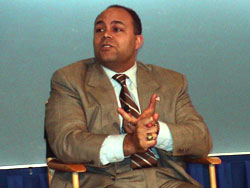FCC Chairman Powell Speaks Out on the ?Future of the Telecom Industry?
12.10.2003 -- “The system is broken,” stated Federal Communications Commission chairman Michael Powell, “because we have no way to get spectrum to the highest and best users.” This was the opening salvo in “a conversation with Michael Powell,” hosted Tuesday this week for more than 200 attendees and Webcast live by Calit², the UCSD Graduate School of International Relations and Pacific Studies (IRPS), and the San Diego Telecom Council.
To address this situation, Powell chartered a task force “with no holds barred” to do a complete, bottom-up evaluation of the telecommunications world. The task force arrived at two important conclusions:
• Most spectrum is not used. More importantly, the real problem is not scarcity, as has been the common wisdom, but lack of access.
• Unlicensed spectrum is a hotbed for innovation: “When you provide a palette to paint on, the American innovator will find something to paint,” he said.
|
Currently, the world, he said, is regulated "in buckets," that is, a given technology is integrated with applications and fits into a particular regulation bucket. And, unfortunately, there is no consideration given to how these buckets interact with or overlap each other to create larger sense and fairness out of the system. But, Powell said, “as technologies converge, so too must the environments that regulate them.” That’s where one of his major challenges lies.
Traditionally, the commission has focused it policy making on transmitters. “But why don’t we focus on receivers?” asked Powell. He cited the concept of “interference temperature” that might be implemented. It’s the limit of acceptable noise. As long as the spectrum user doesn’t exceed this limit, it doesn’t matter how s/he uses the spectrum. He likened this concept to the authority a driver’s license confers: As long as you have the credential and drive safely within the speed limit, you don’t have to worry about being bothered.
Harkening back to his military service, Powell promoted the idea of “guerrilla warfare,” encouraging innovators to let “things take root and blossom before the government comes in and finds them.” We need to “fight little insurgencies,” he said. “You don’t have to blow up a whole bridge. You just need to put one charge in the right place to bring it down.” The hardest fight he’s fought has been to promote commercialization of ultra-wideband: “I didn’t accomplish all I wanted to,” he said, “but it is a beach head.”
|
Calit² director Larry Smarr, who co-hosted the conversation with Peter Cowhey, dean of IRPS and a former FCC commissioner himself, asked Powell about the role of universities as “hothouses” for the federal government. “We will not be relevant,” replied Powell, “if we don’t plug in with the communities.” He added that, when he became FCC chairman, he needed to modernize his forces quickly. The vast majority of the staff found themselves within three years of retirement, so he proceeded to hire “more engineers the first year than had been hired in the previous 40.” He drew laughs from the audience by acknowledging that the downturn in the telecommunications industry certainly served his hiring goal. But he added that, to keep his staff up to date, he focuses on training, visits by faculty scholars, and opportunities to attend relevant conferences.
For insight and guidance he closely watches the behavior of his 14- and 9-year-old sons. “They are the first generation to start with digital technology,” he said, and, by way of explanation, he described how disoriented they became not being able to access any of their electronic devices when the power failed due to a recent hurricane. Resourcefulness did win out, though, he said: “We ended up watching a DVD movie in the car.”
Cowhey then posed the question of what lessons might be drawn from the fact that countries like Japan and Korea seem to be ahead of the U.S. in the telecommunications race. Powell said he’d be happy to bet on the U.S.’ entrepreneurial spirit any time, which he cited as the reason for the Internet first prospering here. “When you’re running a marathon,” he said, “it’s not bad to be in 3rd or 4th place at the 20-mile mark,” believing the U.S. is well positioned to overtake Japan. He pointed to the fact that 93% of Americans gained access to narrowband over a four-year period. If satisfaction breeds complacency, that may account for the sluggishness of large numbers making the effort to move to broadband. He also pointed to cultural differences between the east and west that underlie preferences and investment decisions on a large scale: “Why, for example, do Americans prefer flipflop phones but haven’t taken to instant messaging?” he wondered. Both preferences are contrary to those in Japan.
|
Powell emphasized that the purpose of regulation of telecommunications technology should be to preserve two social goals: ubiquity of access and affordability. “What people unfortunately don’t understand is that regulation has been used traditionally to protect the vested interests of ‘incumbents.’”
“My job is to create a world for innovation,” he concluded, “a ‘space’ for the government to let the American spirit take over.”
Powell was sworn in as a member of the Federal Communications Commission in 1997 and has served as chairman since 2001. He is also the FCC’s defense chairman and is responsible for overseeing all National Security Emergency Preparedness functions for the commission.
Related Links
Click to watch a replay of Powell's comments
Media Contacts



